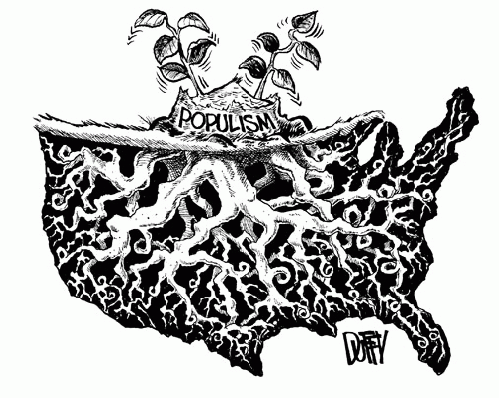The world is undergoing a populist revival. From the revolt against austerity led by the Syriza Party in Greece and the Podemos Party in Spain, to Jeremy Corbyn's surprise victory as Labour leader in the UK, to Donald Trump's ascendancy in the Republican polls, to Bernie Sanders' surprisingly strong challenge to Hillary Clinton -- contenders with their fingers on the popular pulse are surging ahead of their establishment rivals.
Today's populist revolt mimics an earlier one that reached its peak in the US in the 1890s. Then it was all about challenging Wall Street, reclaiming the government's power to create money, curing rampant deflation with US Notes (Greenbacks) or silver coins (then considered the money of the people), nationalizing the banks, and establishing a central bank that actually responded to the will of the people.
Over a century later, Occupy Wall Street revived the populist challenge, armed this time with the Internet and mass media to spread the word. The Occupy movement shined a spotlight on the corrupt culture of greed unleashed by deregulating Wall Street, widening the yawning gap between the 1% and the 99% and destroying jobs, households and the economy.
Donald Trump's populist campaign has not focused much on Wall Street; but Bernie Sanders' has, in spades. Sanders has picked up the baton where Occupy left off, and the disenfranchised Millennials who composed that movement have flocked behind him.
The Failure of Regulation
Sanders' focus on Wall Street has forced his opponent Hillary Clinton to respond to the challenge. Clinton maintains that Sanders' proposals sound good but "will never make it in real life." Her solution is largely to preserve the status quo while imposing more bank regulation.
That approach, however, was already tried with the Dodd-Frank Act, which has not solved the problem although it is currently the longest and most complicated bill ever passed by the US legislature. Dodd-Frank purported to eliminate bailouts, but it did this by replacing them with "bail-ins" -- confiscating the funds of bank creditors, including depositors, to keep too-big-to-fail banks afloat. The costs were merely shifted from the people-as-taxpayers to the people-as-creditors.
Worse, the massive tangle of new regulations has hamstrung the smaller community banks that make the majority of loans to small and medium sized businesses, which in turn create most of the jobs. More regulation would simply force more community banks to sell out to their larger competitors, making the too-bigs even bigger.
In any case, regulatory tweaking has proved to be an inadequate response. Banks backed by an army of lobbyists simply get the laws changed, so that what was formerly criminal behavior becomes legal. (See, e.g., CitiGroup's redrafting of the "push out" rule in December 2015 that completely vitiated the legislative intent.)
What Sanders is proposing, by contrast, is a real financial revolution, a fundamental change in the system itself. His proposals include eliminating Too Big to Fail by breaking up the biggest banks; protecting consumer deposits by reinstating the Glass-Steagall Act (separating investment from depository banking); reviving postal banks as safe depository alternatives; and reforming the Federal Reserve, enlisting it in the service of the people.
Time to Revive the Original Populist Agenda?
Sanders' proposals are a good start. But critics counter that breaking up the biggest banks would be costly, disruptive and destabilizing; and it would not eliminate Wall Street corruption and mismanagement.
Banks today have usurped the power to create the national money supply. As the Bank of England recently acknowledged, banks create money whenever they make loans. Banks determine who gets the money and on what terms. Reducing the biggest banks to less than $50 billion in assets (the Dodd-Frank limit for "too big to fail") would not make them more trustworthy stewards of that power and privilege.
How can banking be made to serve the needs of the people and the economy, while preserving the more functional aspects of today's highly sophisticated global banking system? Perhaps it is time to reconsider the proposals of the early populists. The direct approach to "occupying" the banks is to simply step into their shoes and make them public utilities. Insolvent megabanks can be nationalized -- as they were before 2008. (More on that shortly.)
Making banks public utilities can happen on a local level as well. States and cities can establish publicly-owned depository banks on the highly profitable and efficient model of the Bank of North Dakota. Public banks can partner with community banks to direct credit where it is needed locally; and they can reduce the costs of government by recycling bank profits for public use, eliminating outsized Wall Street fees and obviating the need for derivatives to mitigate risk.
(Note: You can view every article as one long page if you sign up as an Advocate Member, or higher).






